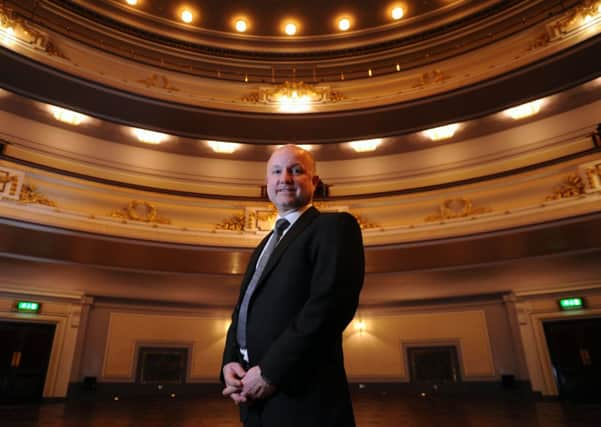Preview: The Usher Hall Centenary Concert


Isabel Dalhousie saw the young man fall from the edge of the upper circle, from the gods. His flight was so sudden and short, and it was for less than a second that she saw him, hair tousled, upside down, his shirt and jacket up around his chest so that his midriff was exposed. And then, striking the edge of the grand circle, he disappeared headfirst towards the stalls below.
These opening lines from Alexander McCall Smith’s The Sunday Philosophy Club offer a fictional, and thankfully uncommon, scene at Edinburgh’s favourite symphonic concert venue, the Usher Hall, which this week celebrates its 100th birthday with a centenary programme, featuring the Royal Scottish National Orchestra, the Edinburgh Royal Choral Union and city organist John Kitchen, that is a modern recreation of the opening concert of 6 March 1914.
Advertisement
Hide AdAnd for the record, the only objects known to have come crashing down into the stalls during the Usher Hall’s first 100 years were the chunks of plaster that liberated themselves from the ceiling during a Tony Bennett concert in 1996, leading to closure, lengthy redevelopment and rejuvenation of a venue that still ranks as one of the finest concert hall acoustics in the world.
Karl Chapman has been its general manager for 13 years. He inherited the agonising slowness of the redevelopment programme; he also doggedly saw it through. As someone holding a degree in ancient history and classical archaeology, his ambition was always to embrace modernisation with an appreciation of the building’s iconic history.
“There’s a huge sense of pride among Edinburgh people in what the Usher Hall stands for, which is, as its benefactor Andrew Usher put it, to provide the perfect place to hear good music,” says Chapman. “It has stood the test of time, and is felt by those who have used it over the years – the Edinburgh Festival, the resident orchestras, and other promoters – to be the jewel in Edinburgh’s cultural crown. Someone from the Philharmonia Orchestra once said to me it was the sort of venue you wanted to pick up and drop in the middle of London.”
Pianist John Lill said as much a few weeks ago when I asked him which of the venues with the RSNO that week he had most enjoyed. His instant reply was: “Well it has to be the Usher Hall. It has a special warmth you just don’t get elsewhere.” Few, it seems, would disagree.
Legendary names have performed on its stage, particularly in over 60 years of world-class Edinburgh International Festival programmes.
Kathleen Ferrier sang Mahler’s Das Lied von der Erde with the Vienna Philharmonic at the inaugural Edinburgh Festival in 1947 with Bruno Walter. Artur Schnabel, one of the greatest Viennese Classical pianists, performed Mozart concertos in 1948, three years before his death, with Ian Whyte and the then BBC Scottish Orchestra.
Advertisement
Hide AdSuccessive festivals saw Shostakovich attend the 1962 festival celebration of his music, and six years later Carlo Maria Guilini struck gold with his 1968 performance of Britten’s War Requiem. The roll call of A-list classical music celebrities is endless.
More recent years have been just as notable, but this week’s centenary concert recreates a very different musical world from the one we know today, not least a Victorian/Edwardian style of programming that disappeared after the First World War.
Advertisement
Hide AdFor instance, the opening concert in March 1914 began with an introductory organ recital by the then organist of St Mary’s Episcopal Cathedral in Edinburgh, Thomas Collinson, including music by Handel, Ole Bull and Bach’s Grand Passacaglia in C minor. John Kitchen will partially re-enact that on Thursday, by including the same Bach masterpiece, but replacing the other repertoire with something more suited to today’s listeners – transcriptions of Rachmaninov and Grieg.
Thomas Søndergård will conduct the modern-day RSNO – the then Scottish Orchestra was conducted in 1914 by Georg Henschel – in Wagner’s Prelude to Act 3 of Lohengrin, McCunn’s Land of the Mountain and the Flood, and Beethoven’s Symphony No 5, handing over the baton to Michael Bawtree, music director of the Edinburgh Royal Choral Union, for Parry’s Blest Pair of Sirens and excerpts from Mendelssohn’s Hymn of Praise.
So much for reliving the past. But how does Chapman see the Usher Hall’s future? There’s certainly a pattern of activity beginning to emerge in the classical music programming outwith the festival, the RSNO’s regular Friday season, and occasional usage by the Scottish Chamber Orchestra, not least the feeling that Sunday afternoon seems to be gaining popularity among Edinburgh concert-goers.
“We are continuing with our international classical music season,” Chapman says. “But we’re going to be moving it to Sunday afternoons. We haven’t got a title for it yet, but we’re looking to develop a concept of Symphonic Sundays.”
“That starts in the autumn,” he adds, well after this week’s centenary concert, which is by no means the final commemoration this year of the venue’s early history. One tribute, in particular, tells a story of the hall’s darker past.
It’s a story that reminds us that any euphoria surrounding the opening in March 1914 was quickly dispelled by the outbreak of war, and the Usher Hall’s usage as an army recruitment hall. It was there that Edinburgh businessman and MP Sir George McCrae recruited his famous First World War battalion of footballers from Hearts, Hibernian and other Scottish teams, the majority of whom were massacred in in the space of a day of fighting during the Battle of the Somme.
Advertisement
Hide Ad“There are plans later this year to rename the area around the Usher Hall McCrae Place,” says Chapman. Fact, as always, can be stranger, more poignant, than fiction.
The Usher Hall Centenary Concert is on 6 March, www.usherhall.co.uk